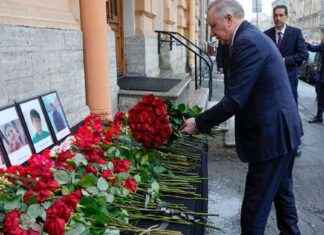The Russian attack was already a few weeks ago, the calls for heavy arms deliveries to the Ukraine were getting louder and louder, so in Berlin an idea met with cross-party approval. The idea seemed pragmatic and effective – and not like a “joke” that Poland couldn’t laugh at after the Federal Republic initially wanted to help out with 5000 helmets.
The so-called ring exchange was intended to give Ukraine access to heavy artillery as quickly as possible. The theory: Eastern NATO partners provide the attacked country with weapons of Soviet design that the armed forces can use without additional training – as a replacement, they receive Western makes from alliance partners such as Germany.
“It’s about getting things done quickly. Weapons are to be delivered immediately,” explained Federal Defense Minister Christine Lambrecht (SPD) at the end of April. After all, the military device must be able to be used “without lengthy training, without further logistics,” said Chancellor Olaf Scholz (SPD). In short: According to Federal Foreign Minister Annalena Baerbock (Bündnis 90/Die Grünen), the exchange of rings is about “the partners who have Soviet-made weapons being able to deliver them quickly, and we then guarantee the replacement accordingly”.
So much for theory and initial euphoria. In practice, the exchange of rings, three months after the idea was born, caused increasing displeasure.
The anger is palpable, especially in Poland, which Germany has once again taken to task in drastic terms. The government in Warsaw, which has already delivered more than 200 Soviet-designed T-72 main battle tanks to Ukraine, has sharply criticized the German government’s offer of compensation in recent days.
The federal government recently made an offer for the delivery of 20 Leopard 2A4 tanks, said Defense Minister Mariusz Blaszczak in an interview with the news portal “wPolityce.pl”, excerpts of which were published on Saturday, and complained that there were around twelve It would take months to get the tanks operational.
In addition, the Polish side is counting on at least one tank battalion, which must include 44 tracked vehicles. “Certainly there are gifts that should only be accepted with great caution,” said Blaszczak. Deputy Foreign Minister Szymon Szynkowski vel Sek even spoke of a “deceptive manoeuvre”.
Foreign Minister Baerbock rejected the accusation of deception and breach of word, but admitted to the “Bild” on Saturday that not everything was going according to plan. “If this path wasn’t the right one, then we have to see how we can become active elsewhere,” she said about the sluggish armor ring exchange with Poland.
Against this background, politicians from the Ampel parties are thinking aloud about an idea that was previously considered taboo: direct arms shipments to Ukraine.
The defense minister showed understanding for the frustration in Poland and expressed “great respect” for the deliveries from Warsaw on Friday, but rejected the criticism of the ring exchange overall. The gaps in the Polish army would have to be filled by German industry, said Lambrecht. “I can’t do that with the Bundeswehr’s stocks if I want to ensure the defense of the country and the alliance.” Talks must be ongoing with industry, said the defense ministers during a visit to the Luftwaffe in Neuburg, although they were certain “that we will come to a good result.”
But when? The Russian war of aggression is entering its 152nd day, and there is no end in sight to the fighting. Instead, Moscow is intensifying its rhetoric, confirming, for example, that it wants to bring about a change of government in Kyiv and occupy other areas. Russia torpedoed a recently concluded agreement on grain exports from Ukraine with a missile attack on the port of Odessa.
Ukrainian President Volodymyr Zelenskyy condemned the rocket attacks as an act of “blatant Russian barbarism”. The blows are another reason for giving Ukraine such weapons “that are necessary for our victory,” he said in his video message published on Saturday evening.
In the east of the country, Ukraine is under heavy pressure, with the capture of Lysychansk, Russia controls the entire Luhansk region. In order to hold the south, Kyiv is apparently planning a counter-offensive. “From a Ukrainian perspective, that’s tactically and strategically understandable,” said security expert Sabine Fischer to “Tagesschau.de”, saying that a lot would be decided in the south in the coming weeks and months. “Since the occupation of these areas, Russia has been trying to build quasi-state structures there, and this is now becoming more and more concrete.”
Despite minor successes by the Ukrainian armed forces, Fischer warns that there is an “imbalance”, for example in the supply of tanks, weapons and ammunition. “Here, a great deal still depends on how quickly and how extensively the west of Ukraine makes military equipment and equipment available in order to be able to achieve these war goals in the south.”
Whether the exchange of rings is the right instrument for this is likely to be the subject of lively discussion in the next few days.






